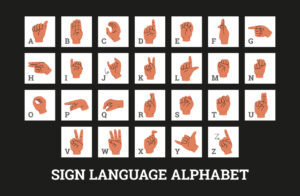Deaf and Hard of Hearing in Jail

Arriving to jail can be a shocking experience for most anyone, even the most seasoned offenders. There are new rules to learn and a whole new social system to understand. Going through this process while being deaf, hard of hearing, or unable to communicate though, can be much harder.
Deaf in Jail
Jails are often known to be more challenging environments than prisons since they are designed for short-term stays. This means amenities such as entertainment, better food, rehabilitative programming or more comprehensive medical resources are often non-existent, or hard to access. This can extend to alternate means of communication such as interpreters, hearing aids or video communications.
New inmates go through a standardized process when they arrive. This usually includes administrative tasks, medical screenings and a brief orientation to the rules and expectations at the facility. But this is also a point where many who are deaf or hard of hearing have indicated instances of discrimination as they go through this process without appropriate communication methods.
Rules and instructions are usually given verbally, and the daily schedule directed by bells or sirens. This leaves the deaf or hard of hearing at a disadvantage when they can’t appropriate engage with commands or instructions. The constant turnover of personnel can also mean there are frequent changes in housing units, and new people entering the system. The uncertainty can be challenging to adjust to, but even more so when an inmate doesn’t have the means to communicate well.
Communication Barriers
These challenges can extend to a number of high-stakes interactions where communication is essential. This can include requesting help, medical assistance, following commands, communicating with other inmates and with people outside of jail. Failing to provide alternative means of communication can cause major hardships, promote isolation and sometimes be dangerous. Some examples include:
- Hand and facial expressions can be misinterpreted and seen as “aggressive” instead of attempts to communicate or use American Sign Language (ASL). This can prompt jail officials to intervene or situations to escalate.
- A lack of access to phones, video screens or cameras so they can have meaningful communications with the outside world.
- Receiving or requesting medical care without an effective means to communicate with the provider or receive instructions relating to their care.
- Disciplinary hearings or other jail matters addressed without an ability to communicate, advocate or understand the proceedings.
- Not understanding or hearing instructions from jail officials (such as where to be and when) which can result in accidental infractions due to confusion.
- Feelings of isolation as the ability to communicate or relate to others inside jail is also diminished.
- Refused services or programs offered to other inmates due to an inability to accommodate their needs.
- Safety issues as a result of not hearing sounds, speech or verbal orders.
Alternate Communication Methods
In their lives before jail, inmates had methods to communicate with others. This could include ASL, interpreters, hearing aids etc. Many request these resources or something similar when arriving to jail. Frequently though, they are unavailable, the request ignored, or poor quality substitutes provided.
Poor and inequitable communication substitutes are often used in jails. A common example is requiring an inmate to write their messages, despite some having a primary language of ASL. Or for some, they are less comfortable or able to communicate in written English. Sometimes jail officials also assume an inmate can read lips, but no two deaf inmates are the same, nor should they be treated the same.
Not being able to express themselves can have effects on all aspects of an inmates life in jail. This can include trying to attend or receive therapy without an interpreter, and having to write their feelings on paper. Or attending disciplinary hearings while in shackles and unable to sign or understand what is going on. Sometimes written efforts can be assumed to be an inmate “snitching” or inappropriately communicating with a guard, which can also make the situation worse.
Living in Silence
“However long a signing person is incarcerated, they are often completely deprived of any communication with any other human.” – Talila Lewis
The isolation and silence of not having a way to communicate with the world can often affect inmates the most. Surviving in a world of silence, often confused and unsure of what is coming next, can have lasting effects.
Some inmates report being so isolated and cut-off from information that they start to lose their ability to sign. Some didn’t even know about the COVID-19 pandemic until months later. In some instances, deaf inmates were rarely housed together with other hard of hearing inmates, and were sometimes lumped together with visually impaired inmates. This deprivation of meaningful human contact can drastically affect their health and well-being.
ADA Requirements
Deaf or hard of hearing inmates are usually the minority, comprising 6%-10% on inmates in federal prisons. However, they still have many of the same rights as their hearing peers. The Americans with Disabilities Act (ADA) requires equal access to programs, spaces and services. As well as an effective means for communication. Section 504 of the Rehabilitation Act is also in place to protect those with disabilities from discrimination.
Despite these protections, many jail systems have policies unique to their county, and variable resources available. Identifying and providing alternate communication methods is often and legal requirement and should be addressed during intake.
A positive step to improve communication methods for inmates is video communication services in prisons. As of January 2024, the Federal Communications Commission (FCC) requires these services in facilities that already have a broadband internet connection, and house at least 50 inmates. This is an important step forward to ensuring all inmates have an ability to communicate with the outside world.
If you or a loved one has experienced hardship while in jail due to hearing difficulties, consider reaching out to one of our experienced attorneys to see if we can help.

